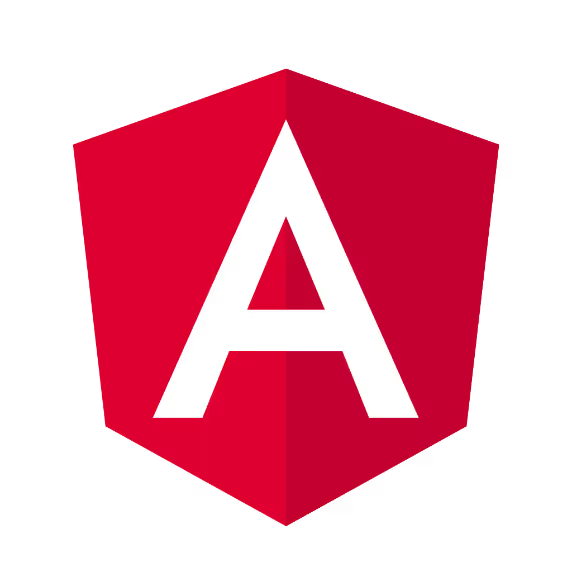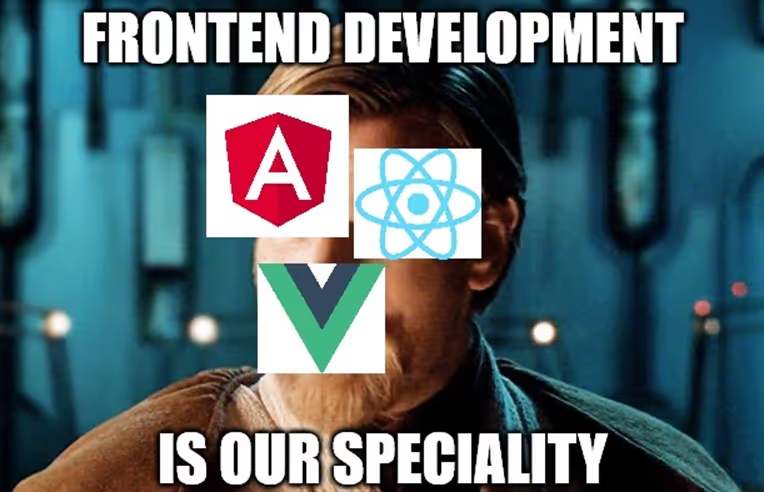

Have you ever Googled "the best JavaScript framework" to discover which framework is the key to becoming a successful JS developer wanted by corporate giants like Google, Meta, and Microsoft?
(I know, I know. You think the metaphor is a little bit on the nose, but it's pretty accurate nonetheless.)
Specific three names will undoubtedly be the most brought up frameworks on your search results page: React, Angular, and Vue. These names stand out because all JavaScript-based, non-trivial applications came to life with the help of at least one of these three famous frameworks.
This article will present you with an in-depth and comprehensive comparison of the holy trinity of JavaScript Frameworks by pointing out all the similarities and differences between React, Angular, and Vue.

What Are Angular, Vue, and React?
Angular, React, and Vue are the most popular frameworks for any project that has something to do with JavaScript, from creating mobile, small-scale applications to building intuitive user interfaces for business web apps. However, before going into the actual comparison, I will guide you through the essential aspects and history of each JS Framework.
What is Angular?

Background
Angular is a TypeScript-based JavaScript framework created by the Angular Team at Google in September 2016. Based on an earlier iteration called AngularJS that the same group of developers released in 2010, the Angular Framework continues to be maintained by Google as it has recently reached its fourteenth version.
Used For / By
Angular is the perfect choice for those who wish to create refined Single Page Applications (SPA). The framework's two-way data binding, which automatically synchronizes the data between the database and the client and eases the development process, is another reason to prefer creating Angular applications. Angular is also a famously monolithic framework specializing in creating applications that combine different components into the same platform, rendering it an excellent choice for e-commerce sites.
Another feature that separates Angular from its rivals is that it comes as a complete framework, meaning it doesn't require additional libraries, unlike other frameworks, to do the job. While it's free and open-source and can be used for both mobile and web apps, Angular works better for more complex applications. Therefore, Angular may be better for experienced developers than beginners.
Google, Microsoft Office, Samsung, PayPal, Wix, and Forbes are among the major companies that rely on Angular.
Pros and Cons
✅ Free and open-source
✅ Ideal for developing Single Page Applications (SPA)
✅ Easier Document Object Model (DOM) manipulation
✅ Two-way data binding
✅ Reusable components
✅ Ideal testing framework
✅ Full-fledged solution
✅ Monolithic framework
✅ Well documented
❌ Better suited for more advanced code developers
❌ Performance issues
An Overview of User Opinions
Angular is the framework of choice for many developers, who believe it's the best option for building user interfaces (UI) out there today. Its component-based nature also allows Angular developers to write reusable code, requiring less coding time. Developers overall agree that Angular is a complete framework that is very easy to understand, but in the end, it suffers from some performance issues.
What is React?

Background
React is the most popular front-end JavaScript framework of today. It was created by Jordan Walke, a software engineer at Facebook (recently rebranded as Meta), in 2011 under FaxJs. Best used for designing dynamic and interactive user interfaces (UI). While its current stable version is 18.x, React is maintained by Meta along with a large community of developers and companies.
Used For / By
With its easy-to-learn nature, this open-source JavaScript Framework can help you save a significant amount of time since it allows you to create reusable components, in other words, creating packages of code to use across the entire application. In addition, React may also be the right framework choice for you since it reigns supreme when it comes to search engine optimization (SEO).
Other reasons for React to attain its top position are its declarative views such as Document Object Models (DOM), and the state-of-the-art React Hooks. While the former trait renders the code more readable and makes it easier to spot errors, the latter allows you to use certain React features without having to write a class.
React's migration friendliness and ability to perform seamless integration certainly don't hurt its popularity in front-end development. The same can be said for JavaScript Syntax Extension (JSX), a unique React extension that makes the syntax almost identical to HTML, making writing React components more accessible.
On the downside, React is a progressive framework that receives frequent updates primarily due to its large developer community. While this can seem like a good thing (and it sort of is) at first glance, you'd need to show extra effort if you want to keep up-to-date. Another side-effect of this, it is harder to find detailed documentation that includes the latest additions to React.
React is the framework of choice in front-end development for many major companies, including Meta (Facebook and Instagram), Netflix, Uber, DropBox, Airbnb, PayPal, and BBC.
Pros and Cons
✅ Free and open-source
✅ Easy to learn
✅ Lightweight
✅ Search engine optimization (SEO) friendly
✅ Large developer community
✅ Ideal for building user interfaces (UI)
✅ Declarative
✅ Reusable components
✅ Migration friendly
✅ Mobile browser support
✅ JavaScript Syntax Extension (JSX)
❌ Hard to keep up-to-date
❌ Lack of detailed documentation with the latest updates
An Overview of User Opinions
As I mentioned before, React holds the #1 spot based on popularity, so it is no surprise that most React user opinions are overwhelmingly positive: Many React developers agree that React is the most manageable JS framework to master and become productive with. Rich user interfaces (UI) and reusable components, two of this framework's standout features, eventually lead to earning more money in a shorter period of time, a prioritized objective for many companies and startups.
What Is Vue?

Background
Vue is another open-source JS Framework created by former Google employee Evan You in February 2014, mainly for building User Interfaces (UI) and Single Page Applications (SPA). A younger Framework that has only reached its third stable version, Vue is maintained by a team of professional developers under You's leadership.
Used For / By
Vue combines two essential aspects of its rivals: Angular's two-way data binding and React's virtual DOM. Free and open-source like the others, Vue distinguishes itself as a flexible and lightweight framework.
Although Vue is the least popular framework of the trio, its popularity is on the rise thanks to its simple, fast, and straightforward design. Naturally a fitting framework for inexperienced developers, you can quickly improve your Vue skills with proper documentation and create well-organized interactive tours beneficial to user onboarding.
One of the most significant downsides of Vue is that it has not joined the mainstream and paves the way for fewer job opportunities, though companies like Adobe, Alibaba, GitLab, and Grammarly deploy Vue for the front-end development of their apps.
Unlike React and Angular, Vue is not backed by a major company like Google and Meta; it is maintained by a community that mainly consists of volunteer contributors supported by Patreon. In return, Vue suffers from a lack of significant updates or speedy bug fixes.
Pros and Cons
✅ Free and open-source
✅ Flexible and lightweight
✅ Easy to learn
✅ Fastest JS Framework available
✅ Two-way data binding
✅ Virtual Document Object Model (DOM)
✅ Good for developing Single Page Applications (SPA)
❌ Fewer job opportunities than its competitors
❌ Lack of constant updates and bug fixes due to a minor developer team
❌ Not ideal for large-scale projects
An Overview of User Opinions
The popularity of Vue is on the rise as many developers find it highly versatile when designing modern applications; however, it hasn't reached React's or Angular's user numbers yet. The consensus over this framework predominantly recommends it for newcomer developers interested in creating simple apps. When it comes to developing more complex projects, Angular and React appear to be more logical choices.
Which Is Better: Vue, React, or Angular?

Popularity
According to a survey by Stack Overflow 40.13% of the developers believe that React is the most commonly used JavaScript Framework. Angular and Vue follow it with 22.96% and 18.97%, respectively.
On the other hand, Vue has 198k stars on GitHub, the leading code hosting platform, surpassing both React (191k) and Angular (83k).
The number of currently live websites based on each JS framework also gives us a different arrangement between the three. Per BuildWith, 11 million websites are using React. While a solid 2 million websites use Vue, only 109k live sites today were created with Angular.
Documentation and ease of development
When it comes to easiness, Vue overshadows the others with its simplicity, flexibility, and unprecedented amount of documentation to give you everything you need to gain mastery over it. Although React's qualities (declarative views, React Hook, etc.) also increase the ease of app development, it's not as straightforward as Vue, with less up-to-the-minute documentation to help you through. Unfortunately, Angular takes the last spot, as it requires more coding time and is best suited for complex applications.
Use cases
React is excellent at a wide range of web or mobile applications—social networks, community-based platforms like forums and marketplaces, anything that can benefit from a well-made interactive user interface (UI) or Single Page Applications (SPA).
Whether mobile or web, Angular specializes in more complex apps. E-commerce sites, video streaming apps, user-generated content portals, and real-time data applications (weather forecast, etc.) are top "when to use" examples for Angular developers.
Vue, on the other hand, is the answer to all your need when you are craving web pages that are small, fast, and lightweight—just like the framework itself. Content delivery platforms, peer-to-peer communities, and software-as-a-service (SaaS) applications are all proper matches for Vue's proficiency.
Job market and community
The number of job listings related to these frameworks behaves proportionally to their popularity per Stack Overflow: Searching React, Angular, and Vue on LinkedIn job listings leads to 344k, 204k, and 113k results, respectively.
Both Angular and React have a large community of developers behind them; however, the number of people using Vue is still limited, not to mention that a big company like the others does not maintain Vue.
Still, Vue's popularity is increasing each day—the number of users watching Vue on GitHub (6.1k) is almost equal to the React followers (6.6k). Angular, though, only has about half of their audience with 3.1k.
Size and load times
The famously lightweight Vue's size is only around 40 kB, while React follows it with an approximate 100 kB. Angular is the heaviest them all, with almost 150 kB. (All file sizes are estimated and uncompressed.)
Unsurprisingly, the load times of these three frameworks correlate with their sizes. Vue is the fastest framework, surpassing React with a small margin. On the other hand, Angular doesn't stand a chance against the two in terms of speed.
For example, extensive simulations comparing the frameworks' performance suggest that it takes 55 and 66 milliseconds for Vue and React to boot up their respective scripts. Angular, however, manages to do the same in about 235 milliseconds.
Licensing
React, Angular, and Vue are all free and open-source JS frameworks released under the MIT License.

Final Words
Choosing the proper JS framework requires a thorough and thorough discovery of what type of applications you are interested in creating, then deciding which framework is best suited for the qualities of your future app projects.
➡ If you are looking for an easy-to-learn framework above all else, Vue and React would be the right call, with the former taking the lead.
➡ On the other hand, Angular and Vue are the frameworks you would want to work with for those attracted to Single Page Applications (SPA) or looking for more accessible Document Object Model (DOM) manipulation.
➡ While complex or monolithic applications fall into Angular's specialty, Vue and React are great at designing interactive User Interfaces (UI).
However, many critical factors such as popularity and job listings point to React.
Frequently Asked Questions
Why is Vue not popular?
Vue is the newest kid on the block, but that doesn't mean it's inferior to others. #1 reason Vue is less popular is that Vue does not have a mega-corporation dedicated to improving the framework's condition. Instead, it is supported by a small group of volunteering developers. Vue's incapability to fully support large-scale development projects is another reason that allows React and Angular to take the lead.
Is Angular dying because of React?
New startups often choose React over Angular since the former is helpful to a broader audience and easier to grasp. However, Angular is not dying because of any other JS framework. If you analyze the latest data on top search queries such as Google Trends, Angular doesn't show any decline in popularity, just like React. On the other hand, there are 100 times more React websites available today than Angular.
Should I consider alternative frameworks other than React, Angular, and Vue?
Yes! React, Angular, and Vue may be in control of the vast majority of the JS framework industry. Still, there are more than two dozen other frameworks that can offer you unique features beneficial to your projects. If you are interested in learning more about these less famous but still valuable solutions, you can check out our list of top 10 JavaScript Frameworks to use.















.svg)
.svg)
.svg)
.svg)
.svg)











.svg)
.svg)




.png)

















